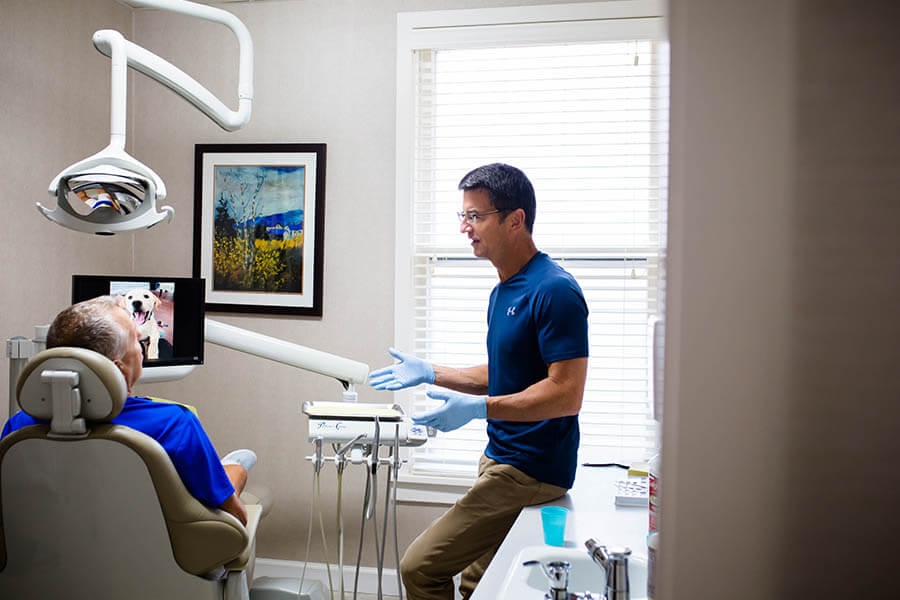SCHEDULE AN APPOINTMENT FOR A COMPLIMENTARY CONSULTATION.
Trusted Post-Operation Dental Care Services in Springfield, Illinois
Preserving and treating your natural teeth is the goal of every family dentist.
However, many individuals are born with hereditary diseases that make it impossible to maintain proper oral health. When this is the case, Dr. James H. McDermott and his staff in Springfield, IL are here to offer alternative solutions to give you a beautiful smile while keeping a healthy mouth. In many instances of tooth decay, tooth extractions, dentures, and partials offer a flawless solution to continuing oral health issues. If we have recommended any one of these treatments, keep reading below to discover what you should expect and avoid in the post-operation healing process.

Post-Operation Tooth Extraction
Tooth extraction, while extremely beneficial for your oral health, is a serious procedure that requires a few weeks of healing to start reaping the benefits. At James H. McDermott D.D.S., we start with an initial examination to determine if a tooth extraction is an appropriate solution depending on the severity of your oral health. Our family dentistry in Springfield, IL is passionate about restoring the health of your teeth and gums. Call our office today to schedule an appointment with Dr. McDermott regarding your tooth pain and potential tooth extraction.
What to Expect & What to Avoid
Bleeding
You will notice some blood right away – don’t worry! Keep a small amount of pressure on the gauze for 30 minutes or until your saliva is no longer red.
Pain
It’s common to feel some discomfort after surgery. If you are experiencing any pain, take 2 Tylenol, Advil, or non-aspirin pain reliever every 3-4 until bedtime.
Nausea
Nausea can be caused by taking pain medication on an empty stomach. Try taking each pain pill with soft food and a large glass of water to reduce nausea.
Numbness
Due to the local anesthesia, your mouth may be numb for several hours after your surgery. Try not to bite, chew, or scratch the numb area until it wears off.
Smoking
Smoking after tooth extraction surgery and throughout the healing process is prohibited and can cause painful dry sockets when inhaling cigarette smoke.
Brushing
For the first 8 hours after your surgery, do not brush your teeth. After this, brush your teeth gently, avoiding the surgical area for at least 3 days until healed.
Rinsing
Avoid rinsing and swishing water or mouthwash for at least 24 hours after surgery. This can disturb the healing process and cause a dry socket.
Diet
Soft foods must be eaten for the first 2 days, do not eat junk food, and drink plenty of water to avoid dry mouth. Avoid alcohol for 48 hours.
Antibiotics
We will prescribe you a pain-relieving medication with directions on how to take them. Inform Dr. James H. McDermott if you are on any current medication.
Activity
Avoid strenuous activities that could potentially raise your blood pressure until your mouth has healed. Low blood pressure with help to reduce bleeding.
Post-Operation Complete & Partial Dentures
Complete and partial dentures offer a permanent solution to tooth decay or genetic disease. Not only can poor oral health threaten your ability to eat and speak, but it can cause feelings of low self-confidence that would otherwise be nonexistent. While new dentures may feel odd and bulky right away, they offer a long-term solution that restores your oral health while giving you the smile you’ve always wanted. Call James H. McDermott, D.D.S. Family Dentistry in Springfield, IL for quality denture fittings.

What to Expect & What to Avoid
Speech
Speech patterns may be interrupted temporarily, however, there is no need to worry. Your tongue, lips, and cheeks just need to get used to your new teeth!
Saliva
An increase in salivary flow is normal as your body will try to get rid of the “foreign bodies” in your mouth. This will decrease over several weeks.
Sore Spots
Sore spots where your dentures or partials are placed are extremely common. We recommend rinsing your mouth with warm salt water to ease any discomfort.
Nighttime
Remove your dentures or partials for at least 6 hours a day to allow the sensitive tissue to recover. Many patients choose to do this before bed each night.
Eating
Start by eating soft foods until you are not experiencing any soreness or discomfort. Practice eating vertically instead of horizontally.
Cleaning
Clean your dentures daily with special toothpaste and separate toothbrush recommended by your dentist to keep them clean and free of food debris.
Longevity
Dentures are meant to last 5-7 years before needing to be replaced. Generally, your dentures will need to be relined every few years to maintain an ideal fit.









